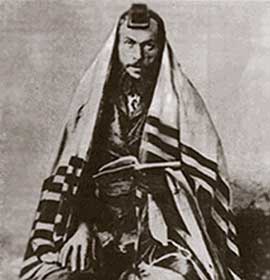 |  |
 |









The Synagogue and new administration |
In the first years after the Revolution, the authorities more or less tolerated Jewish educational organizations, but they were always hostile to the religious community because it was impossible to place its hierarchy under Soviets command. The Commissar of the Jewish Department, S.Ya. Rappoport, proposed simply prohibiting it "taking into account that it is harmful with its composition and with its name as well as being useless and unnecessary with its activity". In the summer of 1918, the Commissar of the People Bank received the following instructions: "Any Jewish establishment, including charitable ones, cannot cash checks without the approval of the Commissariat of Jewish Affairs". In December, 1918, the communes of district chapels were liquidated. On December 12, a proposal to close the Jewish community was directed to the Cheka. A decree signed by G.E. Zinovyev closing the community was issued a week later.![]()
For almost 6 years, Jewish religious organizations operated without central coordination and their activity had no legal base. Only in 1923, after the abolition of Narkomnats, the most active members of religious community could make efforts to restore it. In October, 1924, the founders of the Leningrad Jewish religious community (LERO) met. They decreed: "Taking into account that a substantial number of Jewish religious institutes which exist de facto and go back to the time when Jews first came to Leningrad are not registered anywhere... we adopt regulations to unite the Synagogue and all institutes related to it".![]()
In the note attached to the plan for the regulations that was presented to the Lengorispolkom (Leningrad executive body), it was said that a Jewish community cannot exist without a cemetery and funerals in accordance with Jewish ritual, without a mikva and department of kosher meat, without a Rabbinate and matzoth bakery. Then, it was said, that the "Exemplary Regulations of Religious Societies" developed by the authorities did not take into account the particular features of Jewish religious life. The regulations formulated the purposes of LERO as follows: "The management of Jewish religious affairs and choral synagogue, organization of prayer meetings, management of religious property and its commercial disposal, organization of theological courses". According to the regulations, anyone who "belongs to this religion" can be a member of the community after having attained their majority.![]()
The regulations were affirmed except for the article on theological courses.
On January 26, 1925, the Leningrad Jewish Religious Community (LERO) was registered.
In honor of this event, there was special meeting in the choral synagogue. The appeal to Leningrad Jews was issued with a call to join the religious community; it also expressed the hope for normal religious life in the future. However, those hopes were not fated to come true.![]()
A Jew in tales. Photo of the beginning of 20th century


